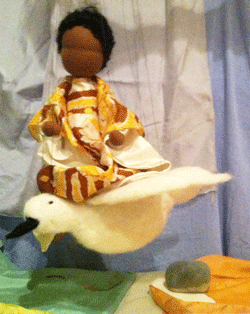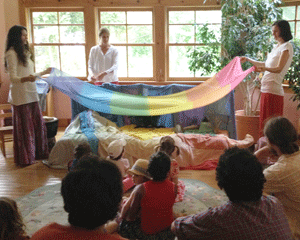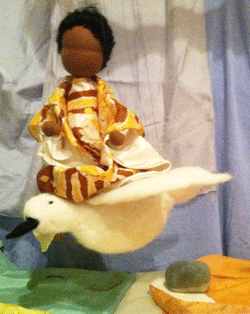 Kerry writes: The story of Mumbuto and the White Bird is a transformative tale written for young children. The life-giving baobob tree holds the central position on the set. The base of the tree is a needle-felted trunk with a jar of water within – which holds branches of fresh green leaves to denote the branches of the tree. Dyed silks designate the different scenes: the baobob tree and village, the river, the grasslands, and the circle of bushes. The boy marionette, Mumbuto, is stuffed with wool roving; his hair is crocheted boucle yarn, his skin a brown cotton fabric, and he has little stones in his hands to give weight. His silk clothing comes from a hand-dyed yellow and brown scarf found at a thrift shop. His mother (and baby brother on her back) are stuffed with an old cotton t-shirt, as I was short on wool roving at the time. (She is a bit heavier than Mumbuto as a result.) Her head piece and adornment are made from a silk tie, also procured at the thrift shop. The White Bird was needle felted at a weekend workshop I attended with Nancy Mellon and Suzanne Down on transformative story telling. With the concept of transformation in mind, the bird in hand, and the “African” silk scarf calling me to make a puppet, the germ of the story, “Mumbuto and the White Bird,” was born.
Kerry writes: The story of Mumbuto and the White Bird is a transformative tale written for young children. The life-giving baobob tree holds the central position on the set. The base of the tree is a needle-felted trunk with a jar of water within – which holds branches of fresh green leaves to denote the branches of the tree. Dyed silks designate the different scenes: the baobob tree and village, the river, the grasslands, and the circle of bushes. The boy marionette, Mumbuto, is stuffed with wool roving; his hair is crocheted boucle yarn, his skin a brown cotton fabric, and he has little stones in his hands to give weight. His silk clothing comes from a hand-dyed yellow and brown scarf found at a thrift shop. His mother (and baby brother on her back) are stuffed with an old cotton t-shirt, as I was short on wool roving at the time. (She is a bit heavier than Mumbuto as a result.) Her head piece and adornment are made from a silk tie, also procured at the thrift shop. The White Bird was needle felted at a weekend workshop I attended with Nancy Mellon and Suzanne Down on transformative story telling. With the concept of transformation in mind, the bird in hand, and the “African” silk scarf calling me to make a puppet, the germ of the story, “Mumbuto and the White Bird,” was born.
The play begins with the lighting of the candle on the stump to the side of the silk- covered set. Next, the long silk is gently lifted and allowed to billow three times before it is slowly laid down in front of the set. Already the breathing of the children watching has deepened, and now they are fully taken in by the scene revealed before them. The White Bird marionette flies across the “landscape,” his wings flapping slowly to the rhythm of the breath of a sleeping child or animal. The bird swoops and turns, silently flying off again from the direction he came. Mumbuto walks on from the opposite end as music from the glockenspiel is heard. He walks to the center of the set and bows his head gently to the audience. Starting with a breath, the narrator begins the tale, “Once upon a time, there was a boy named Mumbuto, who lived far away across many oceans in the Serengeti in Africa.”
Resourceful Mumbuto makes up games with his friends under the baobab tree. He eagerly performs his daily chores, joining his Papa-Toetoe to care for the wild animals that come to the baobab tree at nighttime, and walking far across the grasslands with his Mama(click)la-ka and baby brother to draw water from the river. One day, while left alone, he is overcome with a sense of longing and want. Crestfallen and dejected, he takes himself to his special place where the bushes “form an arc as though their arms are around him.” Here we have the sense that Mother Nature is holding him in her arms; this healing message is a comfort to a young child whose being is intimately connected to the natural world.
As Mumbuto sleeps, the White Bird flies over the land and alights by his side. Mumbuto awakens, climbs onto the bird’s back, and they soar over the landscape. In the distance, he sees the lions and giraffes that he has longed to see, and he sees his father collecting wood, but he does not ask to go there. Rather, he recognizes that he will go there some day, but that now he would like to see the familiar places that fill his daily childhood life. From his “bird’s eye view” he has become reacquainted and re-enamored with the happy rhythms of this life, rhythms which are healing and age appropriate for him. Mumbuto waves goodbye to the White Bird and walks with renewed confidence and strength as he returns to the village to tell his mother and baby brother what he has seen.
Mumbuto is always under the protective guidance of a benevolent being — the baobab tree while he plays, each of his parents as he does chores, Mother Nature when he goes to his special place for solace, and the White Bird as he sleeps and as he explores the world around him.
The kind, loving gestures of the puppets have an ethereal quality which nourishes the child and helps him feel that all is well with the world. Just watching the puppets is therapeutic. Even a young child not following the words of the story soaks in the rhythm and cadence of the narrator’s voice and experiences vicariously Mumbuto’s transformation and feelings of renewed faith, trust and contentment.
Puppets allow children to observe a story in a dreamlike way. When a puppet play is complete, the children continue to gaze dreamily at the set even after the long open silk has been lifted into the air to billow three times, and has been carefully laid back on top. It is important to move slowly and gracefully in closing, to honor this time for the children.
****************************************************************
MUMBUTO AND THE WHITE BIRD (the script, by Kerry B. Brokaw)
(A great white bird flies silently over the land, turns and flies off from whence it came.)
Once upon a time, there was a boy named Mumbuto who lived far away across many oceans in the Serengeti in Africa.
Mumbuto loved to make up games with his friends under the baobob tree. He made a stone tossing game; he placed a stone on the earth, and tossed another small stone to see who could come the closest.
Mumbuto loved to do chores with his “Papa-Toetoe” and his “Mama(click)*la-ka.” With his father he cared for the wild animals that came to share the baobob tree while the village slept.
“What shall the lion require, Papa-Toetoe?” “A quiet land.”
“And the tall giraffe, Papa-Toetoe?” “Soft leaves to nibble on and water to drink, my son.”
And so on, with all the animals.
With his Mama(click) la-ka and his baby brother, he loved to walk far across the grasslands in the early morning to collect water. “Before the sun comes, Mama!” he would say, “So we may see the dew on the grasses!”
As, every morning, even in this dry land, the Earth gave forth beads of dew water. This he would gently touch with his fingers or bend down to lick with his tongue.
But one day when his Papa-Toetoe was in the far hills collecting wood for the village, and his Mama (click) la-ka was busy with the baby and with cooking for the village, he was filled with such a longing…
“How shall I ever see over the hills? How shall I know the path of the lion and the giraffe if they only come close at nighttime?”
Mumbuto walked slowly, his feet lifting just enough to walk, his head drooping. He went to his special place where the bushes made an arc as though their arms were around him, and where he liked to sit and watch the sky.
“Thank you, sky, for being so blue,” he said, and he fell asleep.
A great white bird flew over where he lay, and landed by his side. Mumbuto felt the soft feathers brush his cheek. He opened his eyes. There was the great white bird dipping his wing gently, offering…
Mumbuto climbed onto his back. They flew up…the great white wings flapping slowly…soaring over the land.
He saw the far hills where his papa was collecting wood.
He saw lions sitting on a rock outcropping, and one big lion walking, his mane swaying as he walked.
 He saw giraffes with long necks reaching way up to nibble branches, and bending way down to drink.
He saw giraffes with long necks reaching way up to nibble branches, and bending way down to drink.
“Thank you, White Bird!” he said. “Some day I will go there. But, White Bird, now I should like to see the river where we draw our water!” (They fly together over the river, and so on.)
“Now I should like to see our little stone game by the baobob tree!”
“Now may I see my mother and baby working in our village?”
“Oh, White bird, thank you!”
Then they flew back to his special little place. The bird landed gently, and Mumbuto slipped off his back and hugged him.
He watched the bird fly away. He felt taller and his steps were strong as he walked home to tell his mother what he had seen.
Mumbuto said to his little brother, “Some day I shall show you the White Bird, too.”
* Mama (click) la-ka: the “click” in his mother’s name is a cluck sound made with the tongue on the roof of the mouth – such as the Kung Bushmen use.
